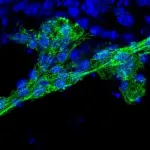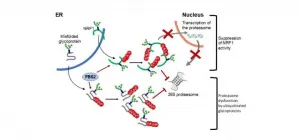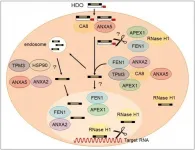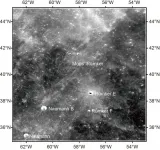Dignity support at end of life
How a two-way approach can promote quality care
2021-07-06
(Press-News.org) At the end of life, people may have to rely on others for help with showering, dressing and going to the toilet. This loss of privacy and independence can be confronting and difficult.
Now Australian occupational therapy (OT) researchers have interviewed 18 people receiving palliative care about how they feel about losing independence with self-care, specifically their intimate hygiene, as function declines with disease progression.
The study aims to raise awareness of how to provide better care for people at the end of life.
Lead researcher Dr Deidre Morgan, a Flinders University occupational therapist with 26 years of clinical experience, says the clear message is there are specific ways to provide assistance with intimate hygiene that may conserve or compromise a person's dignity.
At its core, it comes down to effective two-way communication and providing opportunities for the person to influence how they receive care.
"Asking a person which parts of their intimate hygiene they want help with, which parts they want to do themselves, and how they want this help to be provided can boost a person's sense of agency and control over their care," says Dr Morgan.
The researchers, including OT experts from the Flinders University, Peter MacCallum Cancer Centre, Monash University and SA Government agencies, say the study is a vital reference for health professionals to raise awareness about their responsibilities to enable agency and even support partial independence.
"What we do and what we say can have a profound effect on a person's dignity - especially if we are helping in intimate tasks like showering and going to the toilet," says co-author Celia Marston, from the Peter MacCallum Cancer Centre in Melbourne.
"It is critical that we hear what a person wants the care to look like, or not look like."
One participant, a 65-year-old professional woman with advanced cancer, told researchers that loss of agency and intimate hygiene dependency was so confronting that she couldn't ask for the help she actually wanted.
This shows how important it is for carers to create opportunities for people to voice the help they want, researchers conclude.
INFORMATION:
The article, Conserving dignity and facilitating adaptation to dependency with intimate hygiene for people with advanced disease: A qualitative study (2021) by DD Morgan, C Marston, E Barnard and C Farrow, has been published in Palliative Medicine (Sage) DOI: 10.1177/02692163211017388 https://doi.org/10.1177/02692163211017388
[Attachments] See images for this press release:

ELSE PRESS RELEASES FROM THIS DATE:
2021-07-06
A research team at POSTECH has uncovered a promising new zeolite, anticipated to be a turning point for the oil refining and petrochemical industries. This research was recently published in the scientific journal Science on July 2, 2021.
The team of researchers led by Suk Bong Hong, a professor in the Division of Environmental Science and Engineering at POSTECH, synthesized two thermally stable three-dimensional (3D) large-pore (12-ring)1 zeolites - PST-32 (POSTECH No. 32) and PST-2, the hypothetical SBS/SBT intergrowth structure2 - by using the "multiple inorganic cation" and the "charge density mismatch" synthetic strategies, respectively. The research team identified their structures by using both powder X-ray diffraction ...
2021-07-06
New research in BMC Cancer has shown myelosuppressive chemotherapy destabilises gut microbiome in patients with solid organ cancers.
The study from SAHMRI and Flinders University assessed the gut health of men and women who underwent conventional chemotherapy on cancers, such as breast and lung cancer, without exposure to antibiotics.
"We know that myelosuppressive chemotherapy reduces white blood cell count significantly during the first seven to 10 days of treatment, making the body more vulnerable to infection," says lead author Dr Lito Papanicolas, an infectious diseases expert and clinical microbiologist.
"In this study we focused on how much the individual's microbiome changed over this period, when the ...
2021-07-06
Scientists at UC San Francisco have shown that gene-edited cellular therapeutics can be used to successfully treat cardiovascular and pulmonary diseases, potentially paving the way for developing less expensive cellular therapies to treat diseases for which there are currently few viable options.
The study, in mice, is the first in the emerging field of regenerative cell therapy to show that products from specially engineered induced pluripotent stem cells called "HIP" cells can successfully be employed to treat major diseases while evading the ...
2021-07-06
A 15-year reciprocal transplant study on Guam's native cycad tree, Cycas micronesica, by the Plant Physiology Laboratory at the University of Guam's Western Pacific Tropical Research Center has revealed that acute adaptation to local soil conditions occurs among the tree population and is important in the survival rate of transplanted cycads. The results show that 70% to 100% of cycads that were transplanted in local conditions survived versus less than 10% that were transplanted in foreign conditions. The article describing the study has been published in the peer-reviewed journal Diversity (doi: 10.3390/d13060237).
Transplantation ...
2021-07-06
Vertical greenery 'planted' on the exterior of buildings may help to buffer people against stress, a Nanyang Technological University, Singapore (NTU Singapore) study has found.
The benefits of nature on mental health and for wellbeing have long been recognised, and now a team of NTU Singapore psychologists has used Virtual Reality (VR) to examine whether vertical greenery has a stress buffering effect (ability to moderate the detrimental consequences of stress) in an urban environment.
Using VR headsets, 111 participants were asked to walk down a virtual street for five minutes. Participants were randomly assigned to either a street that featured rows of planted greenery (e.g., on balconies, walls, and pillars of buildings), ...
2021-07-06
Attention training in young people with autism can lead to significant improvements in academic performance, according to a new study.
Researchers at the University of Birmingham in the UK along with institutions in São Paolo, in Brazil, tested a computer programme designed to train basic attention skills among a group of autistic children aged between eight and 14 years old.
They found participants achieved improvements in maths, reading, writing and overall attention both immediately after undergoing the training and at a three-month follow up assessment. Their results are published in Autism Research.
Lead researcher, Dr Carmel Mevorach, in the University of Birmingham's Centre for Human Brain Health, and School of Psychology, says: "It's ...
2021-07-06
The urgency to remember a dangerous experience requires the brain to make a series of potentially dangerous moves: Neurons and other brain cells snap open their DNA in numerous locations--more than previously realized, according to a new study--to provide quick access to genetic instructions for the mechanisms of memory storage.
The extent of these DNA double-strand breaks (DSBs) in multiple key brain regions is surprising and concerning, said study senior author Li-Huei Tsai, Picower Professor of Neuroscience at MIT and director of The Picower Institute for Learning and Memory, because while the breaks are routinely repaired, that process may become more flawed and fragile with age. Tsai's lab has shown that lingering DSBs are associated with neurodegeneration ...
2021-07-06
Peptide: N-glycanase (NGLY1) is an evolutionarily conserved enzyme for removing N-linked glycans (N-glycans) from glycoproteins and is involved in proteostasis of N-glycoproteins in the cytosol. In 2012, a rare genetic disorder called NGLY1 deficiency was discovered by an exome analysis. Symptoms in patients with NGLY1 deficiency include global developmental delay, hypotonia, hypo/alacrima, movement disorder, scoliosis, abnormal liver, brain functions and peripheral neuropathy. Unfortunately, no therapeutic treatment is currently available to this devastating ...
2021-07-06
Researchers from Tokyo Medical and Dental University (TMDU) find proteins that bind to and regulate tocopherol-conjugated heteroduplex oligonucleotides during gene silencing
Tokyo, Japan - Gene silencing therapies are used to interfere with, or "silence", the expression of genes that are associated with disorders. Now, a team at TMDU has uncovered some of the cellular mechanisms by which the silencing therapies act in cells.
Antisense oligonucleotide (ASO) therapies use small strands of DNA or RNA that are antisense, or complementary, to the associated gene to interfere with its expression. ASO therapies are already available for some diseases, particularly neurological disorders, but their use is at a very ...
2021-07-06
China's lunar exploration project can be divided into three steps: "orbiting", "landing" and "returning". At present, the first two have been completed, and the third step, "return", will be achieved by the CE-5, which is the first sample return satellite of China and is expected to drill at a depth of no less than 2 m and bring back about 2 kg of scientific samples. In June 2017, the landing region of CE-5 lunar probe was selected as the Rümker region, which is located in the northern Oceanus Procellarum on the lunar near side and has a long volcanic history and complex geological composition.
Because the geographical scope of the region is not clearly defined, the extent determined by the researchers is 35°-45°N ...
LAST 30 PRESS RELEASES:
[Press-News.org] Dignity support at end of life
How a two-way approach can promote quality care









